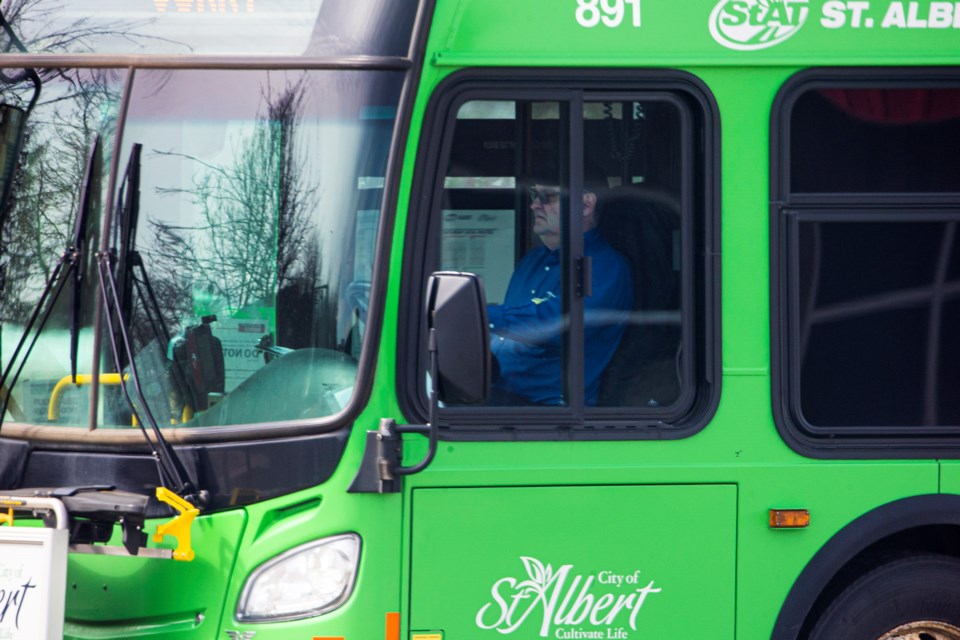St. Albert transit operators are calling for ramped-up bus cleaning and the installation of bus shields, in order to protect against both viral and physical attacks.
The union representing bus drivers in St. Albert made a plea to city council April 14 that current disinfection practices on buses are not sufficient.
Darlene Malayko spoke to council as the elected representative for St. Albert drivers from the Amalgamated Transit Union – Local #569 and said St. Albert should be using its nocospray cleaning devices to disinfect buses too.
“We want to see all safety measures available to stop the spread of virus, and to protect drivers and the public,” Malayko said in an interview with the Gazette, adding bus drivers are front-line workers.
Currently, St. Albert is using three nocospray devices it ordered back in January to clean ambulances and fire trucks, in addition to office spaces that may have been contaminated with COVID-19. They are hospital-grade portable disinfecting units that spray a hydrogen peroxide-based dry vapour on all of the area that is being disinfected.
St. Albert’s transit buses are cleaned nightly after their daytime runs, which includes applying cleaner and then disinfectant to all touch points, in addition to all regular Alberta Health Services-mandated cleaning procedures. But Malayko said buses should be cleaned in between drivers' shift changes as well, as often drivers are coming onto a bus that is not clean.
“That does make them feel unsafe, because they don’t know how many people have been on,” Malayko said. She told council operators have been using their own equipment to disinfect buses throughout the day.
Even as ridership has declined dramatically across St. Albert Transit, and the city has reduced service levels, Malayko noted drivers still come in contact with many people on a daily basis. On Good Friday for example – a quiet day – Malayko said the driver of a commuter route to Edmonton had 53 people board their bus.
St. Albert director of corporate communications and design Cory Sinclair said in an email the city's fogging units are available to "address any confirmed cases of COVID-19 on a City bus," which has not been necessary to date.
Bus shields: 'They're not cheap ... neither is life'
Malayko also called for St. Albert to follow the lead of other transit systems across North American that have installed bus shields to protect drivers.
Edmonton began installing the safety screens that isolate drivers from passengers last May in response to a violent stabbing of a driver in 2018.
Now, in response to COVID-19, the City of Edmonton has decided to only put buses on the road that have bus shields installed, to protect drivers from contracting the virus.
St. Albert bus drivers want the city to follow suit, and Malayko said it should not “take an assault or a COVID epidemic” to think about these items.
Steve Bradshaw, president of the Local #569, said bus shields provide a barrier from droplets that result from people sneezing and coughing.
“That is just absolutely amazing for us, and that's what we'd like to see St. Albert install in their buses,” he said.
“It's well known at this point among the entire population that that virus is spreading through bodily fluids spray. That's why physical distancing is so important, and when you put a solid barrier between two people, that imposes that physical distance.”
St. Albert director of public works and transit Anthony Lake told city council the screens are not part of COVID-19 mitigation efforts. He also said they are not needed to prevent criminal activity toward drivers because St. Albert bus drivers have not experienced assaults.
Malayko noted St. Albert bus drivers do follow routes that take them through high-risk areas in Edmonton, even late at night.
"It shouldn’t take an assault or a COVID epidemic to think about these things," she said. "Safety is something that is an ongoing process."
To date, St. Albert has altered transit operations in response to COVID-19 by eliminating fares, reducing bus capacity to 50 per cent, implementing rear-door loading and roping off the driver’s area.
The cost per bus to install bus shields is about $12,500 in American dollars, Lake said, which includes both the screen and an air conditioning unit.
Bradshaw said St. Albert buses are already air conditioned.
“They're not cheap, no. Neither is life,” he said.
As St. Albert moves forward with regionalization of its transit system – and prepares for the opening of the new Campbell Transit Centre – the city must begin taking a closer look at safety, Malayko said.
Drivers given PPE
In her presentation to city council, Malayko also called for all drivers to be given gloves, masks and hand sanitizer.
An official from St. Albert’s contracted transit operator – Diversified Transportation, part of the Pacific Western Group of Companies – told the Gazette drivers have been given “various levels of PPE” since the start of the COVID-19 crisis. That includes gloves, hand sanitizer, and masks, although drivers are not required to wear masks.
Pacific Western Group of Companies vice president of transit Greg Nichols said – without first knowing what Malayko told the Gazette – “everything” the union representative said is “completely false.”
“The safety of our employees who are out there on the front lines is of utmost and primary importance to us,” he said.
But Bradshaw confirmed drivers were not provided a package of personal protective equipment until Monday, April 13.
He added the union had been asking for PPE and has now been successful in pressuring the employer to do so.
“What we know is that drivers were supplying a lot of their own stuff; they were supplying their own hand sanitizer and their own gloves and so on,” the union president said. He added someone in Calgary (where Pacific Western is headquartered) may well have thought a PPE supply was in place for drivers, but perhaps wasn’t aware packages were not being handed out.




